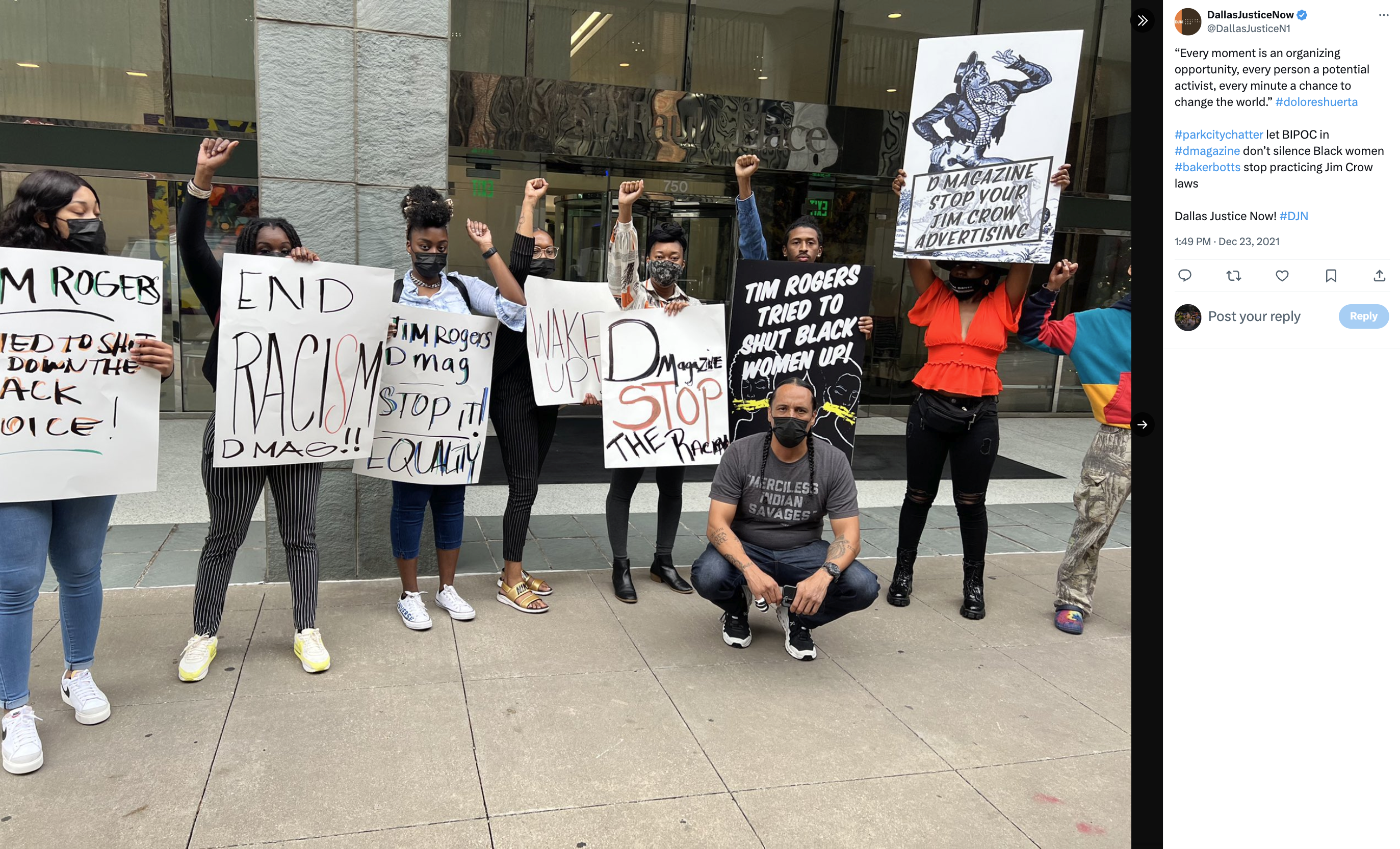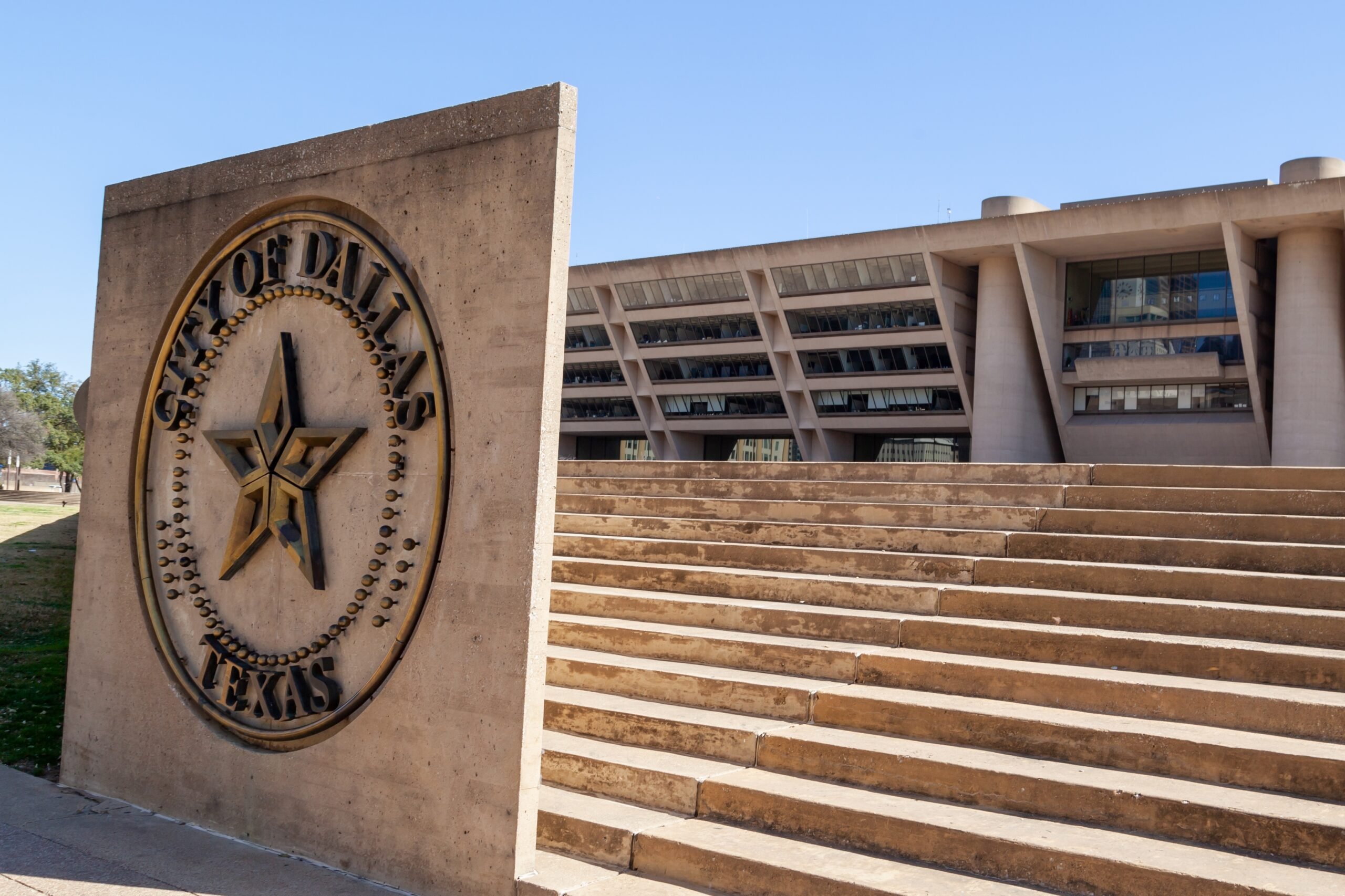At the August 21, 2024, meeting of the Dallas City Council, Joseph Porter stood at the podium and admonished the council members for allegedly “spreading misinformation” about three proposed city charter amendments, which one member has described as “draconian” and the mayor and all council members have publicly opposed.
“Your outward disdain for the citizens of Dallas will not go unnoticed,” said Porter, who was identified only by name. “Because that’s what this is. Any person spreading misinformation about these [charter amendments], trying to subvert the will of the people, it’s totally shameful.”
What Porter did not disclose in his public comment is that he’s the executive director of Keep Dallas Safe, a 501(c)(4) nonprofit—a type of organization sometimes known as “dark money” groups due to the laws that allow them to conceal their donors—that pushes fever-pitched rhetoric about crime in Dallas. Per inside sources and documents reviewed by the Texas Observer, Keep Dallas Safe was created and operated by a California-based publicity firm that orchestrates campaigns and protests, and, according to a former contractor and internal documents, the nonprofit’s creation was financially backed by Monty Bennett—a politically active, yet little-known outside of Dallas, right-wing hotelier and billionaire megadonor—and logistically supported by one of Bennett’s top executives.
The three city charter amendments, collectively branded by backers as the Dallas HERO Initiative, will be on the ballot for Dallasites in the November 5 election. If passed, they would do three things. The first, Proposition S, would allow residents to sue the city over any perceived violations of local or state law and force the city to waive its governmental immunity to such lawsuits—part of a broader trend of Texas Republicans promoting civil litigation to enforce policy. The second, Proposition T, would require an annual survey of residents that could cause the city manager to be fired. The third, Proposition U, would commit future city revenues to the fire and police pension system, which faces a $3.4 billion shortfall, and to increasing the police force to 4,000 officers (which the current police chief says would take 15 years to achieve).
Taken together, the charter amendments could cripple the city’s capacity for self-governance.
“Propositions S, T, and U are a direct attack on the very foundation of local governance,” Dallas Council member Paula Blackmon told the Observer. “If passed, they would strip Dallas of the ability to self-govern by subjecting city decisions to the threat of lawsuits [and] to outside pressures from moneyed interests, like Monty Bennett, that don’t live within the city limits and take pleasure in disrupting local government with lawsuits that have cost taxpayers millions of dollars. … These propositions open the door to chaos and political influence, undermining the structure that allows us to function effectively as a city.”

The three proposed changes reached the ballot thanks to a signature-gathering campaign launched by another 501(c)(4) nonprofit known as Dallas HERO, a self-described bipartisan group that is chaired by a board member of one of Bennett’s companies and has the backing of the Dallas GOP.
The group has refused to disclose its funders, but one self-admitted donor is Bennett—the alleged backer of Keep Dallas Safe and also the publisher of the right-wing nonprofit news outlet the Dallas Express. Bennett has said he’s provided both cash and office space for the HERO initiative, though he does not reside in Dallas city limits: He claims a homestead exemption at a property in Highland Park, a wealthy enclave with its own municipal government, while he is registered to vote in Henderson County, where he also owns property.
Bennett is well known in North Texas for his support of right-wing school board candidates, fierce opposition to a water pipeline, and a Paycheck Protection Program controversy involving his hotel companies. For the past three and a half years, the Observer and other outlets have reported on a right-wing influence network with various connections to Bennett that also includes Dallas Justice Now, a racial justice group critics have deemed “fake,” in addition to Keep Dallas Safe. Since late 2020, these groups have attacked the reputations of sitting Dallas city council members, school board trustees, and local media—with their criticisms reported by the Dallas Express, creating a surround-sound effect across media platforms without generally disclosing behind-the-scenes connections.
As this network has kicked into overdrive to push the Dallas HERO Initiative amendments, the Observer has uncovered new details about a publicity firm key to the foundation and operation of some of these groups: the Beverly Hills-based Crowds on Demand, which is known for hiring paid protesters and executing shadowy campaigns at the behest of clients, and, according to a former Crowds on Demand contractor, internal documents, and Bennett himself, has also worked on behalf of Bennett or his companies. The Observer has also interviewed former Dallas Express employees, who describe Bennett using the 501(c)(3) nonprofit news outlet as a mouthpiece for his political and business interests while simultaneously asserting that other media outlets in town cannot be trusted.
Along the way, experts say the apparent actions of Bennett and employees of his companies may have violated federal Internal Revenue Service (IRS) regulations forbidding nonprofit charities from operating “for the benefit of private interests,” and they’ve also been accused of violating Securities and Exchange Commission (SEC) regulations by using the Dallas Express as an undisclosed participant in a battle between investors.
“The charity is really not acting as a charity. … I’d recommend that charity get shut down.”
These details come as voters consider the Dallas HERO amendments, which represent a possible culmination of Bennett’s yearslong effort to reshape Dallas politics. If passed, the measures—and the political strategy that paved their way—could even serve as a statewide model for Republicans hostile to the state’s Democratic-led cities.
In an email to the Observer, Bennett issued a blanket denial of the findings of this story but admitted that Ashford—the name of a group of hospitality companies he oversees including Ashford Hospitality Trust—had retained the services of Crowds on Demand.
“Local blogger and conspiracy theorist [Steven] Monacelli continues to attempt to knit together random facts (such as the fact that Ashford has retained Crowds on Demand in the past for non-political purposes) into wild-eyed conspiracy theories,” Bennett wrote. “All your conclusions, to the extent that I have knowledge of them, are false.”
Bennett, 60, built his fortune with the hotel business he inherited from his father. The Real Deal, a real estate publication, described Bennett in a 2023 profile as a “pugnacious fighter on a fire and brimstone journey” who’s increasingly waded into battlegrounds of politics—and often won. The origin of this reputation lies in a six-year saga that began in 2010, when the Tarrant Regional Water District (TRWD) announced plans to build a pipeline through the Lazy W, Bennett’s 1500-acre ranch in Henderson County.

In response, as D Magazine reported, Bennett launched an expensive campaign to thwart the pipeline: He sued the TRWD, backed candidates to challenge incumbent TRWD board members, built a cemetery in the proposed path of the pipeline, and even placed exotic animals on the property in a bid for federal wildlife protection. In 2011, Lance Gooden, then a state representative and now a congressman, proposed a bill to form the Lazy W water district, which upon creation effectively granted Bennett governmental powers over his land. (As of 2014, Gooden also co-owned property with Bennett in Henderson County.) In the end, Bennett won, and the TRWD pipeline was redirected around his property. Bennett has since used the governmental powers of the water district in seeking to condemn and absorb 55 acres of a neighbor’s land, according to the San Antonio Express-News.
In 2016, Bennett told D Magazine that the fight with TRWD made him consider getting involved in statewide issues including eminent domain rules and ethical requirements for governmental agencies and officials. Since 2015, Bennett has donated millions to political candidates and causes, including more than $1.1 million to the national Republican party, more than $2.5 million to state-level candidates and political action committees, thousands to right-wing school board candidates, and hundreds of thousands to a variety of other organizations, including ones that promote school privatization.
Bennett had a brush with national notoriety in 2020, when he was “cast as a face of corporate greed,” as reported by the Dallas Morning News, after his companies collectively received at least $69 million in Paycheck Protection Program loans, which were designed to help struggling businesses pay employees during the COVID-19 pandemic. Although Bennett was never legally accused of any misdeed, he faced enormous public pressure on a national level—in part due to the size of his companies and his political donations to President Donald Trump—and ultimately returned the funds.
In October 2020, Bennett became the subject of a second national news scandal. The New York Times detailed how Bennett had “ordered up” articles to promote his business and political agenda on websites associated with a company called Metric Media, which manages a network of over 1,000 local sites, dubbed “pink slime” by media critics, that publish coverage funded by Republican groups and corporate P.R. firms. Both of these scandals were picked up by mainstream local outlets in North Texas.
In early 2021, shortly after Bennett was outside the U.S. Capitol on January 6, he launched the Dallas Express, an online news website initially linked to Metric Media that repurposed the brand of a progressive historic Black-owned newspaper that had shuttered in the 1970s. On the heels of all the negative publicity, this outlet would publish a stream of flattering articles about Bennett’s various ventures while attacking political foes and other local news media.
“Truth has become a casualty in today’s media world,” Bennett wrote in a 2021 letter introducing the Dallas Express. “News has become a vessel to promote favored world views, and objectivity has been sacrificed. There are many publications in our wonderful city, but none we can count on daily to present just the facts. Readers can’t pick up a local publication without seeing bias in one direction or the other. I can’t take it anymore—and I know many of you can’t either. The Dallas Express was created for one purpose; to help make our city a better place. That’s it. It’s a nonprofit operation and there’s no other agenda.”
Media experts beg to differ. “Effectively, the business model here is deception,” said Emily Bell, the founding director of the Tow Center for Digital Journalism at Columbia Journalism School. “It’s not just about them being partisan. It’s about them being dishonest and crossing basic lines of journalism. They’re not even doing journalism. They’re doing P.R., political advertising, or persuasion campaigns.”
Seated at the kitchen table in his suburban apartment near Fort Worth, Daniel Taylor explained how he had come to work as a contractor for Crowds on Demand, a publicity firm that offers “protests, rallies, and advocacy” as a service. Heavy metal streamed out of Taylor’s laptop computer with a desktop background image of Hank Hill, from the King of the Hill animated series, in the style of a character from the Japanese anime Cowboy Bebop. He wore a shirt promoting a Canadian power metal band. His everyday concealed carry SIG Sauer pistol sat within view.
“It felt like being a fucking band of pirates,” Taylor said. “Just running around being little agents of chaos.”

Taylor started working with Crowds on Demand in 2017, he said, when he met the founder and CEO, Adam Swart. Taylor and Swart both told the Observer that Taylor first worked for Crowds on Demand as an individual independent contractor and later through a PR firm Taylor co-founded in 2019 with another Crowds on Demand contractor. Taylor said he eventually became Swart’s right-hand man, managing campaigns nationwide, including a 2018 project in New Orleans for a power company that involved paying people to attend city council meetings in support of a proposed power plant. In 2020, at a time when business was slowing down for many, Swart landed a new project, according to Taylor and documents he shared with the Observer, to promote Ashford Hospitality, then a publicly traded investment trust in Bennett’s hospitality empire, which was voluntarily delisted from the New York Stock exchange in July 2024 amid financial distress.
On April 9, 2020, in the early days of the COVID-19 pandemic, Ashford Hospitality missed a debt payment to a lender, Brookfield Asset Management. An April 12, 2020, Crowds on Demand document titled “Save American Hotels Campaign Rundown,” which Taylor provided the Observer, outlined a phone campaign targeting elected officials, regulators, Brookfield executives and board members, and Brookfield’s top 30 shareholders.
“Hi, I work for Ashford Hospitality Trust, a company which owns over a hundred hotels across America and employs over 7,000 employees,” the campaign script reads. “Our jobs are at risk because of Canadian asset manager Brookfield’s threats to the company about non-payment of debt service. Unbelievably, Ashford missed its first debt service payment this last Thursday, then the next day on Good Friday Brookfield sent us a threatening legal letter making all kinds of outlandish accusations and demanding we take a series of action [sic] by noon on Monday, the day after Easter, during a worldwide pandemic.”
Around the same time, Bennett requested articles be published across multiple Metric Media websites, including ones attacking creditors including Brookfield, according to the New York Times. One article published on April 19, 2020, in a Metric Media publication attacked Brookfield and quoted Bennett. Its author would later write about Dallas Justice Now for the Dallas City Wire, another Metric Media outlet, and pen articles for the Dallas Express.
By mid-September, Taylor said, the hotel-focused campaign was wound down as new groups focused on Dallas were spun up, the first of which was Keep Dallas Safe. Publicly launched in August 2020, the group began at a time when many Dallas activists were calling for police funding to be shifted to social services. Keep Dallas Safe advocates for more police funding and more punitive anti-homeless policies, and its executive director continues to post on social media and speak at city council meetings now. Initially, Taylor—while still working with Crowds on Demand—was the effort’s public face.

Over the course of multiple interviews, Taylor, who said he had been shown messages between Swart and Bennett on multiple occasions, told the Observer that “Monty Bennett was the main backer” of Keep Dallas Safe. Taylor also stated that Bennett or one of his companies provided financial backing for Dallas Justice Now and three other groups: Save Texas Kids, Mission DFW, and La Oportunidad. Taylor and other collaborators called Bennett “Mr. Burns,” Taylor said, in reference to the television character Homer Simpson’s boss.
An email an attorney sent Taylor and Swart on November 17, 2020, reveals more details about the creation of Keep Dallas Safe.
“I have back the approval from Delaware for Keep Dallas Safe, Inc,” wrote Tony McDonald, a lawyer who works as general counsel for the Texas Scorecard, a conservative website formerly affiliated with the Empower Texans political action committee, to which Bennett has donated in the past. “We’ll also need to coordinate, probably with Stephen Zsigray, about setting up bank accounts. But I’ll check with him first.”
At the time, Zsigray was the vice president of corporate finance and strategy of Ashford Hospitality and Zsigray later became Ashford Hospitality’s CEO. A Dallas Express budget reviewed by the Observer reveals that McDonald has provided legal counsel to the Dallas Express. Emails between Swart and Taylor also reference receiving legal advice from McDonald.
In response to Bennett’s broad denial, the Observer requested further clarification about the relationship between Bennett or his companies and the organizations including Keep Dallas Safe, but Bennett did not respond. Neither Tony McDonald nor Stephen Zsigray responded to requests for comment.
When Kaylin McGlothlen left her job at a local TV station in 2022 to work as a staff writer at the Dallas Express, she wasn’t aware of behind-the-scenes connections with advocacy groups or of the publisher’s political leanings.
“One of the initial reasons I applied at Dallas Express to begin with was because I saw that it was an original Black-owned company,” McGlothlen, who is Black, told the Observer.
McGlothlen’s first article was published in December 2022, and her last day would be just two months later. Despite having adopted the brand of a defunct Black newspaper, McGlothlen noticed the publication was not running any Black History Month content. She asked her editor, “Why are we not doing Black History Month stories?” McGlothlen said, and “His response to me was, ‘The publisher thinks it’s too controversial of a topic to cover.’”
McGlothlen decided to quit and soon put in her notice. Three people who worked at the Dallas Express corroborated what McGlothen told the Observer, describing contemporaneous conversations. (After McGlothen left, the Dallas Express ran one Black History month story in late February 2023 that “reflect[ed] on the legacy of its namesake” and claimed “the roots of the modern Dallas Express date all the way back to 1892.”)
Paul Bryant, who worked as a reporter for the Dallas Express from October 2023 to July 2024, was even more blunt about his former employer. “The Dallas Express is a political activist organization using its nonprofit designation as a newspaper to advance the publisher’s personal political and social agendas through what it considers investigative journalism and general news stories,” he told the Observer.
Since February of this year, the Dallas Express CEO has been Chris Putnam, a former Republican congressional candidate who is on the board of a pro-school voucher nonprofit, along with Bennett, and recently served as the campaign finance committee chair for the Tarrant County Republican Party.
The board of the Dallas Express consists of Bennett, his wife Sarah Zubiate (a former Ashford board member), and Brian Wheeler, a current Ashford director.
The Dallas Express operates out of CoPart Tower, the same building as the corporate headquarters of the Ashford group of companies. Its website has provided positive coverage of the Metroplex Civic and Business Association, a conservative alternative to the Dallas Regional Chamber of Commerce that operates on the same floor as the Dallas Express. The Metroplex Civic and Business Association has been cited in over 170 of the publication’s articles, its leader filmed a video with a Dallas Justice Now representative, and the organization counts as a coordinator an Ashford employee who has also supported Dallas HERO during public comment at a city council meeting.
“These amendments reflect an agenda that is contrary to everything Dallas stands for.”
According to Bryant, along with other individuals who have been employed at the Dallas Express but requested not to be named out of fear of retaliation, editors would regularly convey directives or “special requests” sent down from the “12th floor,” a reference to Bennett and the Ashford offices. “It didn’t take me long to realize that the work we were doing was mostly based on what Monty wanted,” Bryant said. “It was Monty’s positions on issues; it was Monty’s beliefs.”
Former Dallas Express employees also shared concerns about the use of pseudonymous authors without disclosure. One active Dallas Express author is “J Galt,” whose website bio lacks a photo and whose name, according to a former employee, is a reference to the protagonist in conservative author Ayn Rand’s novel Atlas Shrugged. Nowhere in the pages of the Dallas Express is this byline explained, but it’s attached to aggregated articles sourced from right-wing outlets like Breitbart and stories supporting the Dallas HERO Initiative.
Internal documents reviewed by the Observer reveal that multiple Ashford executives have been involved in the operation of the Dallas Express. Chief among them is Bennett, who has assigned stories, demanded stories be pulled after publication, and directly edited stories, according to former Dallas Express staff who provided corroborating evidence.
In addition, Jason Killmeyer—vice president of corporate strategy at Ashford Hospitality since 2022 and formerly the chief operating officer of the far-right media outfit Project Veritas—has been heavily involved in the daily editorial decisions, including assigning stories, conveying Bennett’s directives, and writing and editing articles, per the same sources. Killmeyer did not respond to requests for comment.
As a 501(c)(3) nonprofit, the Dallas Express receives tax benefits in exchange for the charitable service of providing “unbiased, non-partisan news coverage for the City and County of Dallas,” per its 990 filings with the IRS. Like all such organizations, it is “prohibited from directly or indirectly participating in, or intervening in, any political campaign on behalf of (or in opposition to) any candidate for elective public office.” It is allowed to engage in some lobbying but can expend only an “insubstantial” amount on those efforts.
In its most recent 990 filing, for the year 2022, the Dallas Express reported $529,557 in revenue and just over $3 million in expenses. It also reported receiving around $3.4 million in loans from Bennett. The outlet’s conflict of interest policy reported in the filing states that board members cannot vote on “any matter in which a director or officer is personally interested as a shareholder, director, officer, trustee, or beneficiary or advisor of a trust, or otherwise has a relationship” and that “all transactions or actions taken on behalf of the corporation” that involve an interested party must be approved by vote.
In addition to political activity restrictions, 501(c)(3) organizations also are subject to an IRS requirement that they not be “organized or operated for the benefit of private interests such as designated individuals, the creator or his family … or persons controlled, directly or indirectly, by such private interests.”
All three Dallas Express board members have a direct stake in Bennett’s for-profit companies, which the outlet has covered repeatedly.
In early 2024, Bennett and his company Braemar, a real estate investment trust that is a part of the Ashford group of companies, fought a proxy battle with an activist investor, Blackwells Capital, during which the Dallas Express published multiple articles about Blackwells Capital. Both sides filed lawsuits, with Blackwells alleging that Bennett violated Section 14(a) of the Securities Exchange Act by failing to disclose the Dallas Express as a proxy participant. The legal spat was resolved when the two sides reached a truce that, according to the Real Deal and an SEC filing, saw Braemar provide Blackwells Capital with a below-market interest rate loan in exchange for an agreement that Blackwells vote to support Braemar’s board nominees for 10 years.
The Observer obtained a draft of a negative Dallas Express article about the head of Blackwells that contains metadata showing that Bennett’s Microsoft account was the last to modify the draft, in addition to a 2023 email showing Bennett approved the publication of the story.
A September 26, 2024, SEC filing distributed by an investor who supported Blackwells’ proxy battle, Alejandro Malbran, questioned whether the truce agreement would benefit shareholders or instead serve Bennett’s personal interest.
“Is it not bribery when Blackwells’ legal fees are covered by the company, and they are given a loan at interest rates lower than what the company borrows at, all in exchange for voting with the board?” the filing reads. “With Blackwells obligated to back whatever the board puts forth, it is clear that any proposal Monty Bennett champions could be pushed through, even if it harms shareholders. This is why we are suspicious of what’s happening behind closed doors.”
Malbran told the Observer he remained concerned about Bennett’s actions. “I believe he has not followed the proper procedure,” Malbran said. “He has not done the appropriate filing of all of the involved parties in the proxy fight.”
Andrew Feller, a former Senior Counsel at the SEC and currently the co-chair of the Securities and Commodities Whistleblower Group for the D.C. law firm Kohn, Kohn & Colapinto, said that whether a violation occurred comes down to Bennett’s influence over the Dallas Express pieces. “The SEC’s rules are clear that proxy solicitation materials must be labeled as such, must be filed with the SEC, and must not be misleading,” he told the Observer. “The question here is whether Mr. Bennett’s control over the content of the articles was such that they constitute proxy materials subject to those rules.”

An internal Dallas Express budget reviewed by the Observer also reveals that tens of thousands of dollars of the nonprofit’s funds were spent on transactions with Remington Hospitality, a subsidiary of Ashford, in 2023. Taken together, experts told the Observer, some of the Dallas Express’ actions may have violated IRS nonprofit regulations.
“If Mr. Bennett, his wife, and Mr. Wheeler [the third Dallas Express board member] all want to promote conservative ideology, they’re free to do that,” said Doug White, a professor at the Valdry Center for Philanthropy at Southern University and the former director of Columbia University’s Master of Science in Fundraising Management program. “But to do so under the umbrella of a nonprofit basically skirts the principle of what I would call the disinterested person or disqualified person. The charity is really not acting as a charity, it is acting as an advocate. … I’d recommend that charity get shut down.”
Marcus Owens, a partner and co-chair of the nonprofits and tax-exempt organizations practice at Loeb & Loeb, LLP, shared similar concerns. “I think it’s unusual for a funder to set up a news media outlet that purports to be providing broad coverage, albeit [in] a limited geographic area, and then their coverage actually promotes the business of the person that funded it,” he said. “That’s a classic private benefit. … The fact that you have facts that show capture, domination, and activities that promote the private benefit of the funders, those are all pretty problematic if they are true. The question comes down to whether it’s the kind of case that goes to the top of the stack on the revenue agents’ supervisor’s desk.”
Even officials with the Republican-controlled Texas House of Representatives have had doubts about the independence of the Dallas Express. In January 2023, the House Business Office rejected the Dallas Express’ requests for press credentials, which allow access to the lower chamber’s floor during legislative sessions, according to a document acquired via a public information request.
“It appears from the foregoing, that Dallas Express Media has published or will publish stories that result in undisclosed promotion of a company in which Mr. Bennett has an interest and from which he, Ashford, other companies, and other individuals may realize a financial benefit,” reads the rejection letter. In response, the Dallas Express appealed, with ex-editor Karin Dyer writing that the outlet “is not controlled by Ashford” and that it “voluntarily discloses the professional ties of our publisher to provide complete transparency for our readers and allow them to form their own opinion regarding our coverage.” This appeal was denied.
The Dallas Express has published hundreds of articles about organizations with connections to Bennett without disclosure. And the Observer could find no instance of the Dallas Express or Bennett ever disclosing the business relationship between Bennett or his companies and Crowds on Demand.
Previously, Bennett has used legal threats and lawsuits in attempts to quash reporting and criticism of his nonprofit news outlet—including a failed lawsuit against the Dallas Weekly and myself personally for an article I wrote in 2021. The Dallas Express wrote multiple articles about the lawsuit quoting another Crowds on Demand-affiliated group, Mission DFW. An attorney representing the Dallas Express also threatened possible litigation in response to a request for comment for my Observer coverage of the Dallas Express in 2023. A Dallas Express editor at the time provided a comment similar to Bennett’s for this story: “Blogger Monacelli ‘s conspiracy theories too numerous to respond to.”
In addition to Keep Dallas Safe and Dallas Justice Now—according to Taylor and emails and documents reviewed by the Observer—Crowds on Demand was involved in the formation and operation of three other Dallas-area-based groups: Save Texas Kids, which campaigned against “woke” teachers, the head of a private school where one of Bennett’s children was a student, and a gender-affirming care clinic at Children’s Medical Center that the Observer found to have privately received pressure from Bennett; Mission DFW, a group aimed to name and shame large corporations for being “too woke”; and La Oportunidad, a low-profile group focused on cultivating favor among conservative Hispanics that was led by Carlos Turcios, who now works as a reporter for the Dallas Express.
Save Texas Kids ceased operations in April 2022, the same month that another outfit called Protect Texas Kids was launched. The latter group is run by Kelly Neidert, a self-described “christo-fascist” who was considered—as shown in an internal Crowds on Demand email sent two months before the group was launched—as a possible head for the now-defunct Save Texas Kids or “for other groups.”
Crowds on Demand groups in Dallas were compartmentalized to maintain the appearance of independence, Taylor said, meaning that the public faces of each group were told only what they needed to know. In the beginning, the person in charge of that compartmentalization was Taylor. What Taylor says he didn’t know was that he too had been kept in the dark about one of Crowds on Demand’s most provocative projects: Dallas Justice Now, a group that portrayed itself as a Black Lives Matter-style advocacy organization but, per Taylor and critics, was actually a sort of false-flag effort.
“With proper funding, protests can be organized on any topic.”
One of Taylor’s longtime collaborators, Shamelle “Shine” Salahuddin, was tasked with managing Dallas Justice Now, according to Taylor and emails reviewed by the Observer. In July 2021, the group distributed letters to wealthy white liberals in Highland Park telling them to not send their children to Ivy League schools in order to save spaces for students of color—spurring a raft of critical articles in right-wing media.
“I was written out of that project,” Taylor said, “because they knew that I would have said that this is a bad idea.”
The day after Dallas Justice Now was skewered on Tucker Carlson, I reported for the Dallas Observer that both Keep Dallas Safe and Dallas Justice Now were using the same right-wing P.R. firm to create their websites. Taylor initially denied that the groups had anything to do with each other. “What’s going on with Dallas Justice Now is stupid and awful and we wholeheartedly condemn that,” Taylor said at the time. “We have nothing to do with it.”
Only later did Taylor discover he too had been misled, he said, when he saw Salahuddin, who lives in Arizona, in a photo on social media with one of the public faces of Dallas Justice Now, Dante “Ndure” Cain. Cain showed emails to the Observer demonstrating that Salahuddin forwarded him content and instructions from Swart, the Crowds on Demand CEO.
In response to the Observer’s requests for comment, Salahuddin said she “was involved to an extent in the beginning of [Dallas Justice Now’s] conception” but that she currently does not “lead and or manage that campaign.” She disputed that the group is a “hoax”—defending “the important work Dallas Justice Now has done in releasing the historic college pledge, pushing for educational opportunities for underserved communities, backing black entrepreneurs and advocating for safe streets”—and she stated that she is a small business owner with a P.R. firm that is “contracted out for advocacy campaigns.” She said she is not involved in “donor relations matters” for Dallas Justice Now but added that “There isn’t a black group that operates without the financial support from wealthy white donors.”
Swart, the Crowds on Demand CEO, did not deny in responses to the Observer that Bennett was his client. Swart emphasized that Crowds on Demand used Taylor as a contractor and not as an employee. He also defended the operations of the Crowds on Demand-affiliated Dallas groups as normal. “Conservative, Liberal, and Independent groups all fundraise and advocate for their positions to the best of their abilities balancing the needs of the grassroots with the positions of donors,” he said. “It’s not exactly a novel concept.”
In April 2022, Taylor said he began reporting to a new manager, Aaron Harris, a long-time Republican political consultant who has formed a political consulting firm and a pro-school voucher group with Bennett. Harris previously served as the chief of staff for Gooden, the ex-state representative and current congressman who has co-owned property with Bennett. In May 2022, Harris sent Taylor a separation agreement, which the Observer reviewed, writing that he spoke with “the powers that be” and the best they could do was a four-week severance package.
Taylor told the Observer the final straw was his refusal of an order to write an op-ed for the Dallas Express about me.
“From the backers,” Swart wrote to Taylor on January 28, 2022. “Send me a draft. I think you know what they’re after here… Have KDS [Keep Dallas Safe] write an Op Ed to Dallas Express about Monacelli. Have it say: 1. How dumb he is 2. How he’s a racist 3. How everyone hates him 4. Include the pic that he included in his lawsuit against the city that shows bruises all over his weak body – to show how weak he is and that he’s a criminal and a menace. 5. How it’s idiots like him that is why our cities are so awful – he promotes crime, he promotes homelessness, he loves blacks to have a shitty education 6. He’s a hypocrite he’s a trust fund kid playing the role of a reporter.”
Taylor put it off, telling Swart in February 2022 that he did not think the article would help them. By April 2022, Harris was calling the shots, and before the end of May, Taylor had been replaced by Stephen Moitz, a graduate from the University of North Texas, where he was a member of the Young Conservatives of Texas alongside the face of Protect Texas Kids, Neidert.
Taylor said he chose to provide the Observer with information for this story because he felt the Crowds on Demand effort “was no longer about accomplishing things” and had become about “just being cruel.”
Interviews with Taylor and Cain, combined with analysis of the Dallas Express archives and internal communications, reveal a pattern. First, a person or organization does something that might upset Bennett or runs counter to his political or business interests. Second, one of the Crowds on Demand-affiliated groups says or does something to attack the subject, such as protest outside their home or business. Finally, the Dallas Express picks up and amplifies the actions of the political advocacy group.
Since January 2021, the Dallas Express has published over 160 articles that either quote or were written by representatives of one of the groups that documents and emails show are linked to Crowds on Demand.
In late 2021, Cain started working as the face of Dallas Justice Now. A charismatic half-Black, half-Native American man with a creative and activist background, Cain was living in Los Angeles when he was approached with an interesting offer: get paid to do canvassing in Dallas. He didn’t ask many questions before taking the job to work under Salahuddin, he said, whom he’d known through social circles in Los Angeles, where Crowds on Demand is based.
His first major assignment, Cain said, was a protest outside of D Magazine on December 17, 2021, for which Cain says he received funding to pay demonstrators to hold signs accusing the publication and editor Tim Rogers of racism—months after the magazine ran a critical story about the Dallas Express. An article about the protest appeared in the Dallas Express four days later.

On the same day as the D Magazine protest, Dallas Justice Now demonstrators arrived outside the home of Amy Genender, a retired lawyer who lives two blocks away from Bennett’s house in Highland Park. Genender is the admin of Park Cities Chatter, a private Facebook group for neighbors who live in Highland Park and University Park (another enclave city). Back in April 2021, after Bennett spent thousands of dollars on mailers backing a right-wing school board candidate in Highland Park, Facebook group members shared Dallas Weekly and D Magazine articles critical of Bennett and the Dallas Express. Within days of those posts, Bennett sent Genender a cease and desist letter on Dallas Express letterhead, warning her not to allow “libel” about the Dallas Express to be shared in the group.
For weeks, Dallas Justice Now circulated emails to Genender’s neighbors that smeared her and the Facebook group she ran with a friend as racist. Like clockwork, the Dallas Express ran articles amplifying the allegations. One report quoted a Dallas Justice Now representative to say Park Cities Chatter is a “tool of white supremacy.”
“It was surreal and bizarre,” Gendender told the Observer. “I kept asking myself why a purported social justice group that popped up out of nowhere targeted and spread boldfaced lies about a neighborhood Facebook group run by two moms. … None of this has anything to do with [Dallas Justice Now]’s purported mission. … It became clear to me that there had to be some personal agenda at play.”
Cain told the Observer he did not control the Dallas Justice Now social media or newsletters and that he didn’t author the written statements and op-eds attributed to him in the Dallas Express.
Over time, Dallas Justice Now began promoting school privatization in the form of school vouchers—a cause that Bennett has steadfastly supported for years. An email Cain received in February 2023 lays out some of the messaging and strategy, which included protesting outside of the home of a Dallas school board member.
“The focus is the idea that underserved neighborhoods NEED school choice and it isn’t something that we are there to negotiate,” wrote an individual identified as Micah Mitchell in an email to Salahuddin and Cain.
Cain told the Observer he increasingly chafed under the directives from his managers and tried to work on efforts of his own design, such as a mentorship program and efforts to help the homeless, which he said he was discouraged from pursuing. The final straw, according to Cain, was an order—after he spoke to me at a March 2023 protest outside the home of a Dallas school board trustee—to malign my reputation.
“I’m literally at a damn Dallas Mavericks game … and I’m getting told to get on Twitter to say that you’re a racist,” Cain said. “I’m like, ‘I’m not doing that.’” (Salahuddin disputed that this was the reason Cain departed the organization.)
Within weeks of Cain quitting, the Dallas Express published an article quoting another Dallas Justice Now representative who accused me of “racist harassment” and falsely claimed that I have a “history of domestic abuse.” The person quoted, Mitchell, is identified on the Dallas Justice Now Facebook page with a stock photo, and Cain said he had never met Mitchell in person. Emails to an address associated with Mitchell went unreturned.
Cain was eventually replaced in June 2023 by Adekoye Adams, who has a longtime Facebook friendship with Salahuddin and appears to have lived in Maryland prior to taking the job in Dallas. In a response to the Observer, Adams said that Salahuddin “brought me into this assignment” and that he was not privy to information about donor relations. He said the organization is “an independent group” that believes in “public safety AND police accountability.” He added: “From this moment forward understand that as President of Dallas Justice Now, I take full responsibility for all online communications, no ‘donors’ have fed me orders.”
Experts say Dallas Justice Now and the other Crowds on Demand-affiliated groups are clear examples of what political scientists call “astroturfing.”
“The term ‘astroturf’ was coined to describe organizations that try to present themselves as grassroots organizations and are actually initiated and funded by donors,” said Anne Nelson, a journalist and research scholar at Columbia University’s School of International and Public Affairs. “The groups themselves are the ‘astroturf,’ Crowds on Demand is a sort of astroturf planter, and the Dallas Express provides the ‘pink-slime’ fertilizer to help the groups grow.”
Recently, both the Dallas Express and Bennett himself have amplified Keep Dallas Safe in support of the Dallas HERO Initiative. Dallas Justice Now has also publicly backed Dallas HERO in posts on social media, and both Keep Dallas Safe and Dallas Justice Now have been amplified by the official Dallas HERO social media account.
In a social media post this June, Bennett appeared to project the strategy of astroturfing onto pro-Palestinian protests across the country.
“It’s amazing to me how much news coverage there is on these pro-Hamas protests but how little coverage there is on the individuals and organizations that are organizing and funding it all,” Bennett wrote. “Without the latter, the protests wouldn’t even exist! With proper funding, protests can be organized on any topic. So the news coverage is misplaced – it implies that there’s massive concern on this topic in America. There is not.”
Prior to the Dallas HERO Initiative, several Dallas City Council members whose policies or candidacies ran counter to Bennett’s preferences were also the target of coordinated criticism. Since 2021, Keep Dallas Safe has sent out mailers, newsletters, and messaging attacking at least eight council members in the runup to elections: Adam Bazaldua, Jaynie Schultz, Jaime Resendez, Omar Narvaez, Paula Blackmon, Jesse Moreno, Gay Donnell Willis, and Carolyn King Arnold.
Emails from Swart have discussed getting approval from “backers” and coordination between the various groups. “Notes from my chat [with] backers Friday,” Swart wrote Taylor on December 5, 2021. “Dallas Express will be putting out a crime section shortly which categorizes crime by district neatly which should be used by KDS [Keep Dallas Safe] regularly to pressure council members on crime/police.”
Two days later, Council member Schultz was labeled the inaugural “crime boss” in the Dallas Express, and a Keep Dallas Safe mailer was drafted to attack her. Since the beginning of the Crime Boss series, all of the aforementioned council members have been subjects of “Crime Boss” articles and have been singled out by Keep Dallas Safe.
Since 2021, Schultz, Blackmon, and Willis have all defeated opponents who were either endorsed by Keep Dallas Safe, were profiled in the Dallas Express, or sit on the board of one of Bennett’s companies.
Bazaldua was singled out for “protests” that involved Crowds on Demand contractors paying homeless people to stand outside his house holding signs and asking for spare change, Taylor said, in the hopes of making Bazaldua’s requests for more resources for the homeless seem hypocritical. In January 2022, Keep Dallas Safe posted a photo of one of those homeless individuals. An internal email from Taylor sent in April 2022 described an “incident” at one of these protests, referring to the arrest of a homeless person on trespassing charges. Bazaldua believes he was targeted because he was a vocal supporter of the Black Lives Matter movement and advocates for less punitive measures to reduce homelessness.
“I don’t know how to make sense of the reasoning behind why any group would think that this was a good idea. … Those actions speak clear volumes to the character of the people that are behind such acts,” Bazaldua told the Observer, adding that using someone as “a pawn in a game that resulted in them being arrested … is just deplorable and something that I absolutely condemn.”
Now, after years of failing to see his preferred candidates elected, Bennett’s strategy has seemingly shifted to backing the Dallas HERO amendments, which face serious opposition from the Dallas City Council.

The spokesperson for the Dallas HERO Initiative, Pete Marocco, has criticized Bazaldua, Blackmon, and Willis for opposing the proposed city charter amendments. Meanwhile, the Dallas Express has acted as a de facto mouthpiece for the campaign, publishing over two dozen articles about it.
On August 14, the majority of the council took a stand against the proposed amendments when 13 of the 15 members—not counting the newly Republican Mayor Eric Johnson—voted to add three additional city charter amendments to the November ballot that, if passed, would effectively nullify the Dallas HERO amendments. Six days later, an employee of Ashford Inc. filed a lawsuit against the City of Dallas, demanding the competing charter amendments be removed from the ballot. Texas Attorney General Ken Paxton, to whom Bennett has given $100,000 in campaign contributions, filed an amicus letter supporting the suit and urging the Texas Supreme Court to intervene. On September 11, the state’s top civil court issued a ruling requiring the council-backed amendments be stripped from the ballot. Bennett has donated thousands in campaign contributions to all but one of the sitting justices, including the one who wrote the opinion.
With one obstacle overcome, the Dallas HERO Initiative must now gain support from a majority of voters for the proposed amendments. Part of the strategy has been to make the initiative seem citizen-led and bipartisan.
When asked in an interview with CBS Texas if the Dallas HERO Initiative was backed by right-wing millionaires who don’t live in Dallas, Marocco—who lives in University Park—said, “It’s not even worth responding to.” Days later, Dallas HERO held a fundraiser at a private home in Highland Park that featured Allen West, the head of the Dallas County GOP, and cost a minimum of $500 per person to attend.
After weeks of obfuscation over who is funding the Dallas HERO Initiative, Bennett admitted in a late September WFAA interview that he was contributing money and office space to the effort. Bennett also acknowledged he doesn’t live within Dallas city limits and is personal friends with Marocco, the initiative’s executive director.
Marocco told the Observer that he “is not affiliated” with Keep Dallas Safe or Dallas Justice Now and that he had “never heard of Crowds on Demand.” He added, “Dallas Hero is nonpartisan and appreciates all our advocates and community partners joining the fight against Dallas’s corrupt city council.”
On November 5, voters will decide on the charter amendments being pushed by Bennett and other nonresident conservatives. The Dallas Morning News editorial board has come out against the proposals, as has a coalition of four former mayors, a former police chief, several former city council members, and elected officials at the county and state level. Even Mayor Johnson and conservative Council member Cara Mendelsohn have now publicly urged voters to vote against the proposals.
“I hope the voters realize that these amendments will not move public safety forward,” Council member Schultz told the Observer. “They will divide us further and create burdens on DPD [the Dallas Police Department] that they do not want. The idea of a small group of residents determining the employment of the City Manager with no accountability is irresponsible. These amendments reflect an agenda that is contrary to everything Dallas stands for.”

